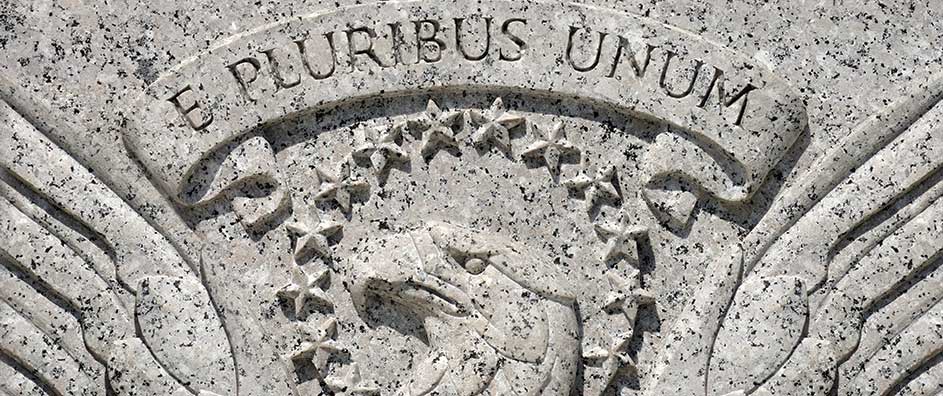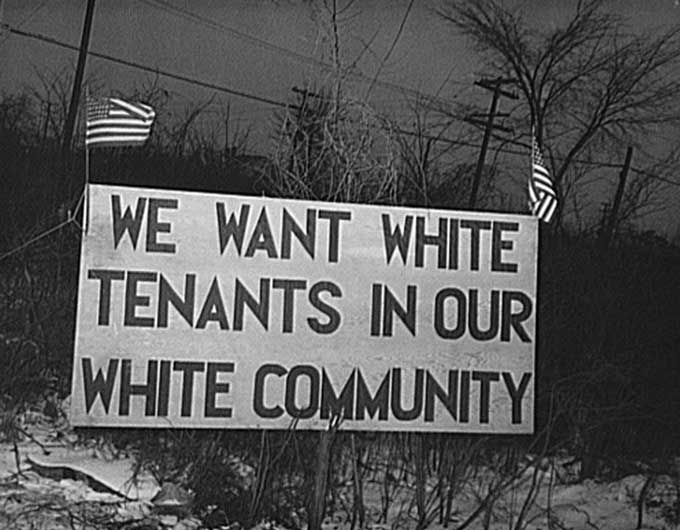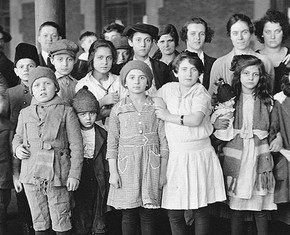The views expressed in our content reflect individual perspectives and do not represent the authoritative views of the Baha'i Faith.
 This is Part 2 Sterling, Bundy and We Are One :
This is Part 2 Sterling, Bundy and We Are One :
When the American revolutionaries decided to break away from Britain and form their own nation, they got together and asked a Swiss guy to decide on a Latin motto from an English men’s magazine.
Yup – true story. E Pluribus Unum – “Out of Many, One” – the original motto of these United States, originally came as a recommendation to the revolutionary committee from Pierre Eugene du Simitiere, who got it from The Gentleman’s Journal, published in London in the last decade of the 17th century. The publisher used the phrase on each issue of his magazine, one of the first iterations of a “reader’s digest” – because he collected articles from many sources, making them into one issue of the magazine.
E Pluribus Unum has thirteen letters, convenient for a collection of thirteen colonies, and of course it suggests that the new colonies aspired to one united federal presence. The motto used to be ubiquitous until the 1950’s – more on that in a minute – although you can still find it on American passports, on the one dollar bill and on the Presidential Seal.
At first, 18th and 19th century Americans understood the motto of their young country as a reference to its federal system – a group of united states. Since the Constitution counted black men as three-fifths of a person, it certainly didn’t denote racial unity. Later, though, the meaning expanded as the country’s diversity increased, and Americans from all backgrounds, religions and racial groups began to think of E Pluribus Unum as the motto of the “melting pot” – out of many different kinds of people, one nation.
But that changed in 1956, when the civil rights movement had begun to gain steam and the anti-communist fervor of the Cold War ran hot. Despite the fact that E Pluribus Unum had worked just fine for 180 years, Congress passed a joint resolution in ’56 that officially changed the national motto from E Pluribus Unum to “In God We Trust.” Marketed as a way to promote organized religion as an alternative to “atheistic, godless communism,” the resolution had no trouble passing – especially since it had the unanimous support of the white Southern “Dixiecrats,” the racist politicians who opposed equal rights for minorities. They saw the newly-emergent meaning of our venerable national motto – out of many, one — as a growing affront to their political, racial and religious prejudices.
Today, most of America’s coins and bills have lost E Pluribus Unum and instead say In God We Trust – despite Teddy Roosevelt’s opposition a hundred years ago, on the grounds of sacrilege. (He thought putting God’s name on money violated our spiritual principles, but Congress overruled him.)
Ironically, America lost its oneness-promoting motto just as it entered into the era of civil rights.
But with or without E Pluribus Unum as its official motto, the American ideal of unity remains deeply woven into the social fabric of the nation. The United States remains the most diverse country on earth, and the American populace, in poll after poll, accepts and supports that diversity. So what should we do about the continuing lack of racial unity in America? Recent racist rants from infamous figures notwithstanding, most Americans definitely appreciate and encourage the ideal of unity in diversity.
In a 2013 Rockefeller Center poll, more than seven out of 10 Americans (71 percent) said they support “new steps to reduce racial and ethnic inequality in America through investments in areas like education, job training, and infrastructure improvement,” compared to just 27 percent who are opposed. This includes 63 percent support among white people. The same poll found that “positive sentiments about opportunities from rising diversity tend to outweigh negative concerns.”
From a Baha’i perspective, these growing levels of acceptance of diversity reflect the Baha’i principles of the oneness of humanity – but they also show us that every racial group must make tireless efforts to address the racism and prejudice that stubbornly remains. Shoghi Effendi, the Guardian of the Baha’i Faith, writing in the 1930’s, specifically asked white people to take ownership of the issue:
Let the white make a supreme effort in their resolve to contribute their share to the solution of this problem, to abandon once for all their usually inherent and at times subconscious sense of superiority, to correct their tendency towards revealing a patronizing attitude towards the members of the other race, to persuade them through their intimate, spontaneous and informal association with them of the genuineness of their friendship and the sincerity of their intentions, and to master their impatience of any lack of responsiveness on the part of a people who have received, for so long a period, such grievous and slow-healing wounds. – Advent of Divine Justice, pp. 39-40.
He then asks black people, “through a corresponding effort on their part” to:
…show by every means in their power the warmth of their response, their readiness to forget the past, and their ability to wipe out every trace of suspicion that may still linger in their hearts and minds. – ibid, p. 40.
Then, writing about the serious effort it takes to truly eradicate racism, he addresses all of us:
Let neither think that the solution of so vast a problem is a matter that exclusively concerns the other. Let neither think that such a problem can either easily or immediately be resolved. Let neither think that they can wait confidently for the solution of this problem until the initiative has been taken, and the favorable circumstances created, by agencies that stand outside the orbit of their Faith. Let neither think that anything short of genuine love, extreme patience, true humility, consummate tact, sound initiative, mature wisdom, and deliberate, persistent, and prayerful effort, can succeed in blotting out the stain which this patent evil has left on the fair name of their common country. – ibid, p. 40.
If Americans would take to heart this serious prescription for healing the effects of racism, perhaps we could actually learn to model, for the first time ever, the true meaning of E Pluribus Unum.
Read the next article: Let’s Talk About American Racism
Read the previous article: Sterling, Bundy and We Are One

















Comments
Sign in or create an account
Continue with Googleor